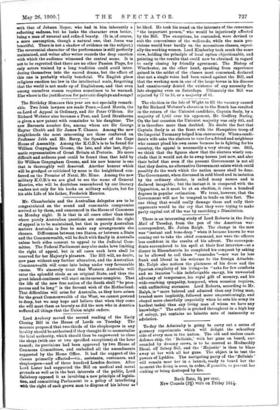Lord Avebury moved the second reading of the Early Closing
Bill in the House of Lords on Tuesday. The measure proposed that two-thirds of the shopkeepers in any locality should be authorised if they thought fit to memorialise the local authority, which should then be empowered to close the shops (with one or two specified exceptions) at the hour named; its provisions had been approved by two House of Commons Committees, and embodied all the amendments suggested by the Home Office. It had the support of the classes primarily affected—vie., assistants, customers, and shopkeepers—and of three hundred London doctors. After Lord Lister had supported the Bill on medical and moral grounds as well as in the best interests of the public, Lord Salisbury opposed it as involving a new principle of legisla- tion, and committing Parliament to a policy of interfering With the right of each grown man to dispose of his labour as he liked. He took his stand on the interests of the consumer, "the important person," who would be injuriously affected by the Bill. The exceptions, he contended, were devised to suit the convenience of the well-to-do, while the main pro- visions would bear hardly on the necessitous classes, especi- ally the working women. Lord Kimberley took much the same view, holding the principle of local option objectionable, and pointing to the results that could now be obtained in regard to early closing by friendly agreement. The Bishop of Winchester, on the other hand, speaking from experience gained in the midst of the classes most concerned, declared that not a single voioe had been raised against the Bill, and that the working men in one of the large towns in his diocese had unanimously denied the existence of any necessity for late shopping even on Saturdays. Ultimately the Bill was rejected by 77 to 16, or a majority of 61.






































 Previous page
Previous page